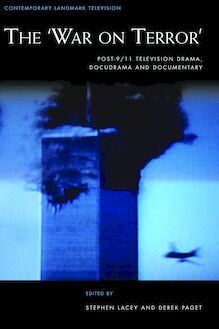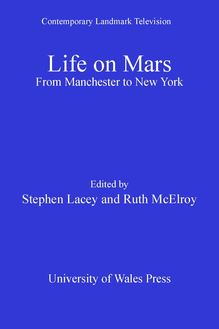The ‘War on Terror’ , livre ebook
111
pages
English
Ebooks
2015
Vous pourrez modifier la taille du texte de cet ouvrage
Obtenez un accès à la bibliothèque pour le consulter en ligne En savoir plus
Découvre YouScribe en t'inscrivant gratuitement
Découvre YouScribe en t'inscrivant gratuitement
111
pages
English
Ebooks
2015
Vous pourrez modifier la taille du texte de cet ouvrage
Obtenez un accès à la bibliothèque pour le consulter en ligne En savoir plus
Publié par
Date de parution
22 mai 2015
Nombre de lectures
0
EAN13
9781783162475
Langue
English
This book explores the ways in which television has engaged directly and indirectly with the new realities of the post-9/11 world. It offers detailed analysis of a number of key programmes and series that engage with, or are haunted by, the aftermath of the events of September 11 in the USA and what is unavoidably through problematically and contentiously referred to as the resulting ‘war on terror’.
The substantive part of the book is a series of independent chapters, each written on a different topic and considering different programmes. It includes series and single dramas representing the invasion of Iraq (The Mark of Cain, Occupation and Generation Kill), comedic representations (Gary, Tank Commander), documentary (the BBC Panorama’s coverage of 9/11), ‘what if’ docudramas (Dirty War), 9/11 in popular series (CSI:NY) and representations of Tony Blair in drama and docudrama. The book concludes with an extended reflection on contemporary docudrama and an interview with filmmaker and docudramatist Peter Kosminsky.
1. Introduction
Stephen Lacey and Derek Paget
2. Ways of Showing, Ways of Telling
Derek Paget
3. Embedded dramaturgy – representing the ‘war on terror’ from within: Ten Days to War, The Mark of Cain and Occupation
Stephen Lacey
4. Post 9/11 American Television Drama: 24 and Generation Kill as Melodrama
Steve Lipkin
5. The comedy of terror: Gary: Tank Commander and the TV sitcom’s ‘discourse of impropriety’.
Bruce Bennett
6. The Paranoid Style’s traumatic speculations of suffering
Hugh Ortega Breton
7. Mac and Monotheism: Remembering 9/11, Surviving Trauma and Mourning Work in CSI: NY
Janet McCabe
8. Britz, Contemporary British National Identity and the ‘War on Terror’
Steve Blandford
9. ‘It Won’t Be Iraq They’ll Remember Me For, Will It?’: Tony Blair and Dramatisations of The War On Terror
Stella Bruzzi
10. Panorama's coverage of 9/11 and the ‘War on Terror'
David McQueen
11. Interview with Peter Kosminsky
Peter Kosminsky and Derek Paget
12. Texts cited
13. Bibliography
Publié par
Date de parution
22 mai 2015
Nombre de lectures
0
EAN13
9781783162475
Langue
English
CONTEMPORARY LANDMARK TELEVISION
THE ‘WAR ON TERROR’
Series editors Professor Steve Blandford (University of South Wales) Professor Stephen Lacey (University of South Wales) Dr Ruth McElroy (University of South Wales)
CONTEMPORARY LANDMARK TELEVISION
THE ‘WAR ON TERROR’
POST-9/11 TELEVISION DRAMA, DOCUDRAMA AND DOCUMENTARY
Edited by Stephen Lacey and Derek Paget
© The Contributors, 2015
All rights reserved. No part of this book may be reproduced in any material form (including photocopying or storing it in any medium by electronic means and whether or not transiently or incidentally to some other use of this publication) without the written permission of the copyright owner except in accordance with the provisions of the Copyright, Designs and Patents Act 1988. Applications for the copyright owner’s written permission to reproduce any part of this publication should be addressed to The University of Wales Press, 10 Columbus Walk, Brigantine Place, Cardiff CF10 4UP.
www.uwp.co.uk
British Library Cataloguing-in-Publication Data A catalogue record for this book is available from the British Library.
ISBN: 978-1-78316-245-1 eISBN: 978-1-78316-247-5
The right of the Contributors to be identified as authors of this work has been asserted in accordance with sections 77, 78 and 79 of the Copyright, Designs and Patents Act 1988.
Cover image: Television image, 11 September 2001 © Eddie Gerald / Alamy
CONTENTS
Series Editors’ Preface
Notes on Contributors
Introduction
Stephen Lacey and Derek Paget
1 Ways of Showing, Ways of Telling
Television and 9/11
Derek Paget
2 Embedded Dramaturgy
Representing the ‘War on Terror’ from Within: Ten Days to War , The Mark of Cain and Occupation
Stephen Lacey
3 Post-9/11 American Television Drama
24 and Generation Kill as Melodrama
Stephen N. Lipkin
4 The Comedy of Terror
Gary: Tank Commander and the TV Sitcom’s ‘Discourse of Impropriety’
Bruce Bennett
5 The Paranoid Style’s Traumatic Speculations of Suffering
Hugh Ortega Breton
6 Mac and Monotheism
Remembering 9/11, Surviving Trauma and Mourning Work in CSI: NY
Janet McCabe
7 Britz , Contemporary British National Identity and the ‘War on Terror’
Steve Blandford
8 ‘It Won’t Be Iraq They’ll Remember Me For, Will It?’
Tony Blair and Dramatisations of the ‘War On Terror’
Stella Bruzzi
9 Panorama ’s Coverage of 9/11 and the ‘War on Terror’
David McQueen
10 Interview with Peter Kosminsky
Derek Paget
Texts Cited
Bibliography
SERIES EDITORS’ PREFACE
T HERE IS NO DOUBT that the landscape of broadcasting has been transformed in recent years, and the speed of change shows no sign of slowing. Technological change (satellite and digital television, the rise of the Internet), the internationalisation of television formats and programmes, the availability of DVD box-sets, new technologies for recording and time-shifting viewing, the proliferation of TV channels and the segmentation of the TV audience – these have all ensured that television, once dubbed ‘ephemeral’, is now a major cultural commodity in a global marketplace. The discipline of television studies, although a relative newcomer to the field of cultural and media studies, has grown confident in its ability to confront and debate the challenges that the new ecology of broadcasting poses.
Contemporary Landmark Television focuses on one corner of the wider picture, British programmes, in recognition of their continuing significance for both home and overseas audiences. The series offers scholars and lecturers timely investigations of current UK broadcasting, through a focus upon television’s prime output: programmes. By being responsive to the contemporary television landscape, the series recognises that television scholarship benefits from engaging with the current viewing experience of scholars and students. For us, one of the enduring values of television as a mass medium lies in its contemporaneity with its audience; television exists in the moment – even when that ‘moment’ is lengthened by new technologies of recording and distribution – and in so doing, enjoys a privileged position as a creative source of artistic and social intervention in the world of its viewers.
The choice to engage with programmes themselves is recognition of the turn towards television aesthetics in recent scholarship, and of the now contentious nature of some of the accepted categories. Terms such as ‘landmark’, and its synonyms such as ‘classic’ or ‘quality’, cannot be assumed but must be debated, and a reflection on key terms is an important aspect of the series’ approach. Also, broadcasters such as the BBC and Channel 4 have sought to meet the challenge of digitalisation by exploiting online programme assemblages (the chat room, forum, and programme games and quizzes), and these have become staples of British television drama, in the process significantly extending our understanding of what constitutes a television programme. Therefore, an important emphasis of the series is the treatment of individual programmes or series ‘in the round’ – in their production and reception contexts, and where relevant in their different iterations. It also draws on, where possible, the perspectives of practitioners and television professionals themselves. Programmes – even long-running series – exist in a wider context of other programmes, and the series will occasionally consider clusters of programmes linked by a common theme.
Although aimed primarily at students and scholars of television, Contemporary Landmark Television intends to be accessible to the general reader with an interest in how television programmes have been commissioned, produced, debated and enjoyed, as well as to professional broadcasters. Whoever the reader, we hope that he or she will be both stimulated and challenged by the experience.
NOTES ON CONTRIBUTORS
Dr Bruce Bennett is Director of Film Studies in the Lancaster Institute for the Contemporary Arts at Lancaster University. Publications include articles on celebrity culture, James Cameron and blockbuster cinema, the aesthetics of digital 3D cinema, border cinema and the figure of the immigrant, and the ‘war on terror’ in film, television and photojournalism. He is author of the monograph The Cinema of Michael Winterbottom: Borders, Intimacy, Terror (Columbia University Press, 2014) and co-editor of the collection Cinema and Technology: Theories, Cultures, Practices (Palgrave Macmillan, 2008).
Steve Blandford is Emeritus Professor of the University of South Wales. Until 2013, he was Director of the Centre for the Study of Media and Culture of Small Nations, and was co-researcher on ‘Screening the Nation: Landmark Television in Wales’ for the BBC Trust and Audience Council Wales (2009–10). He has published widely on British television and theatre, including Film, Drama and The Break-Up of Britain (Intellect, 2007), Theatre and Performance in Small Nations (Intellect, 2012) and Jimmy McGovern (MUP, 2013). He is a member of the Board of the National Theatre of Wales.
Stella Bruzzi is Professor of Film and Television Studies at the University of Warwick and a Fellow of the British Academy. Her publications include the monographs Undressing Cinema: Clothing and Identity in the Movies (Routledge, 1997), New Documentary (Routledge, 2000 and 2006), Bringing Up Daddy: Fatherhood and Masculinity in Post-war Hollywood (BFI, 2005), Seven Up (2006) and Men’s Cinema: Masculinity and Mise-en-Scene in Hollywood (EUP, 2013). With Pamela Church Gibson she co-edited Fashion Cultures: Theories, Exploration and Analysis (Routledge, 2000) and Fashion Cultures Revisited (Routledge, 2013).
Peter Kosminsky is an internationally known writer and film-maker, whose career has included documentaries, feature films and, significantly, drama series and high-profile documentary dramas. His acclaimed drama for television includes: The Dying of the Light (BBC, 1994); Walking on the Moon (ITV, 1999); No Child of Mine (ITV, 1997); Warriors (BBC, 1999); The Project (BBC, 2002). Especially relevant for this book are The Government Inspector (Channel 4, 2005), which considered the death of the government weapons inspector David Kelly; Britz (Channel 4, 2007), a two-part exploration of the radicalisation of British Muslims (2001) in the context of the impact of anti-terrorist legislation, and The Promise (Channel 4, 2010), a four-part series which juxtaposed the British withdrawal from Palestine after the Second World War with the contemporary conflict in Gaza. In 2015, his six-part mini-series Wolf Hall , based on Hilary Mantel’s epic novels about Thomas Cromwell, was a huge hit when screened on BBC2.
Stephen Lacey is Emeritus Professor at the University of South Wales. He has published widely on post-war British theatre and television drama, including Tony Garnett (MUP, 2006) and Cathy Come Home (BFI/Palgrave, 2010). He is editor (with Jonathan Bignell) of British Television Drama: Past, Present and Future (Palgrave, 2nd edition 2014 [2000]). He was Co-investigator on the AHRC-funded ‘Spaces of Television: production, site and style’ (with the Universities of Reading and Leicester, 2010–15). He is a founding editor and member of the editorial board of the international television journal Critical Studies in Television.
Stephen N. Lipkin teaches film study, scriptwriting, and film and video production in Western Michigan University’s School of Communication. He is the author of Real Emotional Logic: Film and Television Docudrama as Persuasive Practice (Southern Illinois UP, 2002) and Docudrama Performs the Past: Arenas of Argument in Film Based On True Stories (Cambridge Scholars Publishing, 2011). His research focuses on recurring rhetorical strategies in recent biopics, docudrama’s representation of social issues, and war. He has published essays regularly in Quarterly Review of Film and Video , Cinema Journal , the Journal of Film and Video , Jump Cut and


